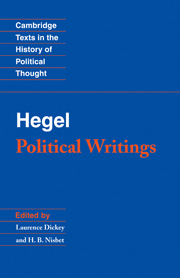Book contents
- Frontmatter
- Contents
- Editors' note
- General introduction
- Chronology of Hegel's life and career
- Translator's preface
- List of abbreviations
- The Texts
- The Magistrates should be Elected by the People (1798)
- The German Constitution (1798–1802)
- On the Scientific Ways of Treating Natural Law, on its Place in Practical Philosophy, and its Relation to the Positive Sciences of Right (1802–1803)
- Inaugural Address, Delivered at the University of Berlin (22 October 1818)
- Address on the Tercentenary of the Submission of the Augsburg Confession (25 June 1830)
- Lectures on the Philosophy of History (1827–1831)
- The Relationship of Religion to the State (1831)
- On the English Reform Bill (1831)
- Editorial notes
- Glossary
- Bibliography of works cited in this edition
- Index of names
- Index of subjects
- Cambridge Texts in the History of Political Thought
Address on the Tercentenary of the Submission of the Augsburg Confession (25 June 1830)
Published online by Cambridge University Press: 05 June 2012
- Frontmatter
- Contents
- Editors' note
- General introduction
- Chronology of Hegel's life and career
- Translator's preface
- List of abbreviations
- The Texts
- The Magistrates should be Elected by the People (1798)
- The German Constitution (1798–1802)
- On the Scientific Ways of Treating Natural Law, on its Place in Practical Philosophy, and its Relation to the Positive Sciences of Right (1802–1803)
- Inaugural Address, Delivered at the University of Berlin (22 October 1818)
- Address on the Tercentenary of the Submission of the Augsburg Confession (25 June 1830)
- Lectures on the Philosophy of History (1827–1831)
- The Relationship of Religion to the State (1831)
- On the English Reform Bill (1831)
- Editorial notes
- Glossary
- Bibliography of works cited in this edition
- Index of names
- Index of subjects
- Cambridge Texts in the History of Political Thought
Summary
Most excellent, illustrious, reverend men, most learned and congenial colleagues, most honourable companions in study, most esteemed listeners of every rank!
The most venerable Senate has instructed me to comment on the occasion and cause of the celebration with which the King has authorised this university to mark today's festival. Since that immortal act which we now commemorate concerned the profession and establishment of religious doctrine, it appears fitting that our admirable Theological Faculty should play the leading part in this festivity. Its estimable Dean will accordingly give us a fitting and learned account of the event in question and profoundly impress its significance upon us. But what happened at Augsburg was not enacted by an assembly of Doctors of Theology and leaders of the Church; nor did they embark on a learned disputation in order to determine the truth and to require the lay community to accept it as certain and observe it with dutiful obedience. On the contrary, the main significance of that day was that the princes of the [German] states and the burgomasters of the Imperial Cities publicly declared that the Protestant [evangelicam] doctrine, freed at last from a mass of superstitions, errors, lies, and all kinds of injustices and abuses, was now finally perfected and elevated above the uncertain outcome of disputations, above the arbitrary will, and above all worldly authority, and that they [i.e. the princes and burgomasters] had now taken up the cause of religion.
- Type
- Chapter
- Information
- Hegel: Political Writings , pp. 186 - 196Publisher: Cambridge University PressPrint publication year: 1999



